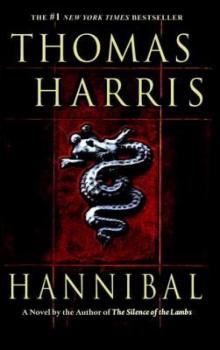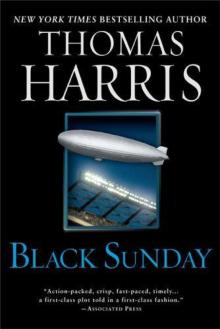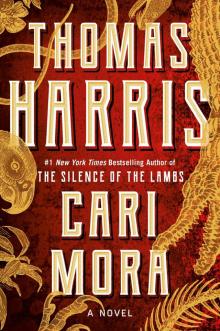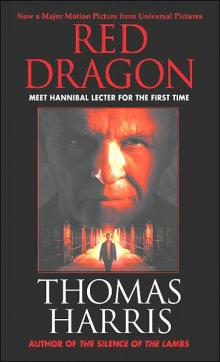- Home
- Thomas Harris
Hannibal Rising Page 6
Hannibal Rising Read online
Page 6
“Let’s put the flowers here, Hannibal,” Lady Murasaki said, clearing a place on the altar before the photos of his parents.
“This is where I pray for you, and I strongly recommend you pray for yourself, that you consult the spirits of your family for wisdom and strength.”
Out of courtesy he bowed his head at the altar for a moment, but the pull of the armor was swarming him, he felt it all up his side. He went to the rack to touch the weapons. Lady Murasaki stopped him with an upraised hand.
“This armor stood in the embassy in Paris when my father was ambassador to France before the war. We hid it from the Germans. I only touch it once a year. On my great-great-great-grandfather’s birthday I am honored to clean his armor and his weapons and oil them with camellia oil and oil of cloves, a lovely scent.”
She removed the stopper from a vial and offered him a sniff.
There was a scroll on the dais before the armor. It was unrolled only enough to show the first panel, the samurai wearing the armor at a levee of his retainers. As Lady Murasaki arranged the items on the God shelf, Hannibal unrolled the scroll to the next panel, where the figure in armor is presiding at a samurai head presentation, each of the enemy heads tagged with the name of the deceased, the tag attached to the hair, or in the case of baldness, tied to the ear.
Lady Murasaki took the scroll from him gently and rolled it up again to show only her ancestor in his armor.
“This is after the battle for Osaka Castle,” she said. “There are other, more suitable scrolls that will interest you. Hannibal, it would please your uncle and me very much if you became the kind of man your father was, that your uncle is.”
Hannibal looked at the armor, a questioning glance.
She read the question in his face. “Like him too? In some ways, but with more compassion”—she glanced at the armor as though it could hear and smiled at Hannibal—“but I wouldn’t say that in front of him in Japanese.”
She came closer, the candle lamp in her hand. “Hannibal, you can leave the land of nightmare. You can be anything that you can imagine. Come onto the bridge of dreams. Will you come with me?”
She was very different from his mother. She was not his mother, but he felt her in his chest. His intense regard may have unsettled her; she chose to break the mood.
“The bridge of dreams leads everywhere, but first it passes through the doctor’s office, and the schoolroom,” she said. “Will you come?”
Hannibal followed her, but first he took the bloodstained peony, lost among the flowers, and placed it on the dais before the armor.
17
DR. J. RUFIN PRACTICED in a townhouse with a tiny garden. The discreet sign beside the gate bore his name and his titles: DOCTEUR EN MÉDECINE, PH.D., PSYCHIATRE.
Count Lecter and Lady Murasaki sat in straight chairs in the waiting room amid Dr. Rufin’s patients, some of whom had difficulty sitting still.
The doctor’s inner office was heavy Victorian, with two armchairs on opposite sides of the fireplace, a chaise longue with a fringed throw and, nearer the windows, an examining table and stainless-steel sterilizer.
Dr. Rufin, bearded and middle aged, and Hannibal sat in the armchairs, the doctor speaking to him in a low and pleasant voice.
“Hannibal, as you watch the metronome swinging, swinging, and listen to the sound of my voice, you will enter a state we call wakeful sleep. I won’t ask you to speak, but I want you to try to make a vocal sound to indicate yes or no. You have a sense of peace, of drifting.”
Between them on a table, the pendulum of a ticking metronome wagged back and forth. A clock painted with zodiac signs and cherubs ticked on the mantle. As Dr. Rufin talked, Hannibal counted the beats of the metronome against those of the clock. They went in and out of phase. Hannibal wondered if, counting the intervals in and out of phase, and measuring the wagging pendulum of the metronome, he could calculate the length of the unseen pendulum inside the clock. He decided yes, Dr. Rufin talking all the while.
“A sound with your mouth, Hannibal, any sound will do.”
Hannibal, his eyes fixed dutifully on the metronome, made a low-pitched farting sound by flubbering air between his tongue and lower lip.
“That’s very good,” Dr. Rufin said. “You remain calm in the state of wakeful sleep. And what sound might we use for no? No, Hannibal. No.”
Hannibal made a high farting sound by taking his lower lip between his teeth and expelling air from his cheek past his upper gum.
“This is communicating, Hannibal, and you can do it. Do you think we can work forward now, you and I together?”
Hannibal’s affirmative was loud enough to be audible in the waiting room, where patients exchanged anxious looks. Count Lecter went so far as to cross his legs and clear his throat and Lady Murasaki’s lovely eyes rolled slowly toward the ceiling.
A squirrelly-looking man said, “That wasn’t me.”
“Hannibal, I know that your sleep is often disturbed,” Dr. Rufin said. “Remaining calm now in the state of wakeful sleep, can you tell me some of the things you see in dreams?”
Hannibal, counting ticks, gave Dr. Rufin a reflective flubber.
The clock used the Roman IV on its face, rather than IIII, for symmetry with the VIII on the other side. Hannibal wondered if that meant it had Roman striking—two chimes, one meaning “five” and another meaning “one.”
The doctor handed him a pad. “Could you write down perhaps some of the things you see? You call out your sister’s name, do you see your sister?”
Hannibal nodded.
In Lecter Castle some of the clocks had Roman striking and some did not, but all those that did have Roman striking had the IV rather than IIII. When Mr. Jakov opened a clock and explained the escapement, he told about Knibb and his early clocks with Roman striking—it would be good to visit in his mind the Hall of Clocks to examine the escapement. He considered going there right now, but it would be a long shout for Dr. Rufin.
“Hannibal. Hannibal. When you think about the last time you saw your sister, would you write down what you see? Would you write down what you imagine you see?”
Hannibal wrote without looking at the pad, counting both the beats of the metronome and those of the clock at the same time.
Looking at the pad Dr. Rufin appeared encouraged. “You see her baby teeth? Only her baby teeth? Where do you see them, Hannibal?”
Hannibal reached out and stopped the pendulum, regarded its length, and the position of the weight against a scale on the metronome. He wrote on the pad: In a stool pit, Doctor. May I open the back of the clock?
Hannibal waited outside with the other patients.
“It was you, it wasn’t me,” the squirrelly patient offered. “You might as well admit it. Do you have any gum?”
“I tried to ask him further about his sister, but he closed down,” Dr. Rufin said. The count stood behind Lady Murasaki’s chair in the examining room. “To be frank, he is perfectly opaque to me. I have examined him and physically he is sound. I find scars on his scalp but no evidence of a depressed fracture. But I would guess the hemispheres of his brain may be acting independently, as they do in some cases of head trauma, when communication between the hemispheres is compromised. He follows several trains of thought at once, without distraction from any, and one of the trains is always for his own amusement.
“The scar on his neck is the mark of a chain frozen to the skin. I have seen others like it, just after the war when the camps were opened. He will not say what happened to his sister. I think he knows, whether he realizes it or not, and here is the danger: The mind remembers what it can afford to remember and at its own speed. He will remember when he can stand it.
“I would not push him, and it’s futile to try to hypnotize him. If he remembers too soon, he could freeze inside forever to get away from the pain. You will keep him in your home?”
“Yes,” they both said quickly.
Rufin nodded. “Involve him in your family as mu
ch as you can. As he emerges, he will become more attached to you than you can imagine.”
18
THE HIGH FRENCH SUMMER, a pollen haze on the surface of the Essonne and ducks in the reeds. Hannibal still did not speak, but he had dreamless sleep, and the appetite of a growing thirteen-year-old.
His uncle Robert Lecter was warmer and less guarded than Hannibal’s father had been. He had a kind of artist’s recklessness in him that had lasted and combined with the recklessness of age.
There was a gallery on the roof where they could walk. Pollen had gathered in drifts in the valleys of the roof, gilding the moss, and parachute spiders rode by on the wind. They could see the silver curve of the river through the trees.
The count was tall and birdlike. His skin was grey in the good light on the roof. His hands on the railing were thin, but they looked like Hannibal’s father’s hands.
“Our family, we are somewhat unusual people, Hannibal,” he said. “We learn it early, I expect you already know. You’ll become more comfortable with it in years to come, if it bothers you now. You have lost your family and your home, but you have me and you have Sheba. Is she not a delight? Her father brought her to an exhibition of mine at the Tokyo Metropolitan twenty-five years ago. I had never seen so beautiful a child. Fifteen years later, when he became Ambassador to France, she came too. I could not believe my luck and showed up at the embassy at once, announcing my intention to convert to Shinto. He said my religion was not among his primary concerns. He has never approved of me but he likes my pictures. Pictures! Come.
“This is my studio.” It was a big whitewashed room on the top floor of the chateau. Canvases in progress stood on easels and more were propped against the walls. A chaise longue sat on a low platform and, beside it on a coat stand, was a kimono. A draped canvas stood on an easel nearby.
They passed into an adjoining room, where a big easel stood with a pad of blank newsprint, charcoal and some tubes of color.
“I have made a space here for you, your own studio,” the count said. “You can find relief here, Hannibal. When you feel that you may explode, draw instead! Paint! Big arm motions, lots of color. Don’t try to aim it or finesse it when you draw. You will get enough finesse from Sheba.” He looked beyond the trees to the river. “I’ll see you at lunch. Ask Madame Brigitte to find you a hat. We’ll row in the late afternoon, after your lessons.”
After the count left him, Hannibal did not at once go to his easel; he wandered about the studio looking at the count’s works in progress. He put his hand on the chaise, touched the kimono on its peg and held it to his face. He stood before the draped easel and raised the cloth. The count was painting Lady Murasaki nude on the chaise. The picture came into Hannibal’s wide eyes, points of light danced in his pupils, fireflies glowed in his night.
Fall approached and Lady Murasaki organized lawn suppers where they could view the harvest moon and hear the fall insects. They waited for the moon-rise, Chiyoh playing the lute in the dark when the crickets faltered. With only the rustle of silk and a fragrance to guide him, Hannibal always knew exactly where Lady Murasaki was.
The French crickets were no match for the superb bell cricket of Japan, the suzumushi, the count explained to him, but they would do. The count had sent to Japan a number of times before the war to try to obtain suzumushi crickets for Lady Murasaki but none had survived the trip and he never told her.
On still evenings, when the air was damp after a rain, they played the Aroma Identification Game, Hannibal burning a variety of barks and incense on a mica chip for Chiyoh to identify. Lady Murasaki played the koto on these occasions so Chiyoh could concentrate, her teacher sometimes providing musical hints from a repertoire Hannibal could not follow.
He was sent to monitor classes in the village school, and was an object of curiosity because he could not recite. On his second day a lout from an upper form spit in the hair of a small first-grader and Hannibal broke the spitter’s coccyx and his nose. He was sent home, his expression never changing throughout.
He attended Chiyoh’s lessons at home instead. Chiyoh had been engaged for years to the son of a diplomatic family in Japan and now, at thirteen, she was learning from Lady Murasaki the skills she would need.
The instruction was very different from that of Mr. Jakov, but the subjects had a peculiar beauty, like Mr. Jakov’s mathematics, and Hannibal found them fascinating.
Standing near the good light from the windows in her salon, Lady Murasaki taught calligraphy, painting on sheets of the daily newspaper, and could achieve remarkably delicate effects with a large brush. Here was the symbol for eternity, a triangular shape pleasing to contemplate. Beneath this graceful symbol, the headline on the newspaper sheet read DOCTORS INDICTED AT NUREMBERG.
“This exercise is called Eternity in Eight Strokes,” she said. “Try it.”
At the end of class, Lady Murasaki and Chiyoh each folded an origami crane, which they would later put on the altar in the attic.
Hannibal picked up a piece of origami paper to make a crane. Chiyoh’s questioning glance at Lady Murasaki made him feel like an outsider for a moment. Lady Murasaki handed him a scissors. (Later she would correct Chiyoh for the lapse, which could not be permitted in a diplomatic setting.)
“Chiyoh has a cousin in Hiroshima named Sadako,” Lady Murasaki explained. “She is dying of radiation poisoning. Sadako believes that if she folds one thousand paper cranes she will survive. Her strength is limited, and we help her each day by making paper cranes. Whether the cranes are curative or not, as we make them she is in our thoughts, along with others everywhere poisoned by the war. You would fold cranes for us, Hannibal, and we would fold them for you. Let us make cranes together for Sadako.”
19
ON THURSDAYS the village had a good market under umbrellas around the fountain and statue of Marshal Foch. There was a briny vinegar on the wind from the pickle merchant and the fish and shellfish on beds of seaweed brought the smell of the ocean.
A few radios played rival tunes. The organ grinder and his monkey released after breakfast from their frequent accommodation in the jail, ground out “Sous les Ponts de Paris” relentlessly until someone gave them a glass of wine and a piece of peanut brittle, respectively. The organ grinder drank all the wine at once and confiscated half the peanut brittle for himself, the monkey noting with his wise little eyes which pocket his master put the candy in. Two gendarmes gave the musician the usual futile admonitions and found the pastry stall.
Lady Murasaki’s objective was Legumes Bulot, the premier vegetable booth, to obtain fiddlehead ferns. Fiddleheads were a great favorite of the count, and they sold out early.
Hannibal trailed behind her carrying a basket. He paused to watch as a cheese merchant oiled a length of piano wire and used it to cut a great wheel of Grana. The merchant gave him a bite and asked him to recommend it to Madame.
Lady Murasaki did not see any fiddleheads on display and before she had the chance to ask, Bulot of the Vegetables brought a basket of the coiled ferns from under his counter. “Madame, these are so superlative I would not allow the sun to touch them. Awaiting your arrival, I covered them with this cloth, dampened not with water, but with actual garden dew.”
Across the aisle from the greengrocer, Paul Momund sat in his bloody apron at a butcher-block table cleaning fowl, throwing the offal into a bucket, and dividing gizzards and livers between two bowls. The butcher was a big, beefy man with a tattoo on his forearm—a cherry with the legend Void la Mienne, où est la Tienne? The red of the cherry had faded paler than the blood on his hands. Paul the Butcher’s brother, more suited to dealing with the public, worked the counter under the banner of Momund’s Fine Meats.
Paul’s brother brought him a goose to draw. Paul had a drink from the bottle of marc beside him and wiped his face with his bloody hand, leaving blood and feathers on his cheeks.
“Take it easy, Paul,” his brother said. “We have a long day.”
“Why don�
��t you pluck the fucking thing? I think you’d rather pluck than fuck,” Paul the Butcher said, to his own intense amusement.
Hannibal was looking at a pig’s head in a display case when he heard Paul’s voice.
“Hey Japonnaise!”
And the voice of Bulot of the Vegetables: “Please, Monsieur! That is unacceptable.”
And Paul again: “Hey Japonnaise, tell me, is it true that your pussy runs crossways? With a little puff of straight hairs like an explosion?”
Hannibal saw Paul then, his face smeared with blood and feathers, like the Blue-Eyed One, like the Blue-Eyed One gnawing a birdskin.
Paul turned to his brother now. “I’ll tell you, I had one in Marseilles one time that could take your whole—”
The leg of lamb smashing into Paul’s face drove him over backward in a spill of bird intestines, Hannibal on top of him, the leg of lamb rising and slamming down until it slipped from Hannibal’s hand, the boy reaching behind him for the poultry knife on the table, not finding it, finding a handful of chicken innards and smashing them into Paul’s face, the butcher pounding at him with his great bloody hands. Paul’s brother kicked Hannibal in the back of the head, picked up a veal hammer from the counter, Lady Murasaki flying into the butcher stall, shoved away and then a cry “Kiai!”
Lady Murasaki held a large butcher knife against the butcher’s brother’s throat, exactly where he would stick a pig, and she said, “Be perfectly still, Messieurs.” They froze for a long moment, the police whistles coming, Paul’s great hands around Hannibal’s throat and his brother’s eye twitching on the side where the steel touched his neck, Hannibal feeling, feeling on the tabletop behind him. The two gendarmes, slipping on the offal, pulled Paul the Butcher and Hannibal apart, a gendarme prying the boy off the butcher, lifting him off the ground and setting him on the other side of the booth.
Hannibal’s voice was rusty with disuse, but the butcher understood him. He said “Beast” very calmly. It sounded like taxonomy rather than insult.

 The Silence of the Lambs
The Silence of the Lambs Red Dragon
Red Dragon Hannibal
Hannibal Black Sunday
Black Sunday Cari Mora
Cari Mora Hannibal Rising
Hannibal Rising Red Dragon hl-1
Red Dragon hl-1 The Silence of the Lambs (Hannibal Lecter)
The Silence of the Lambs (Hannibal Lecter)